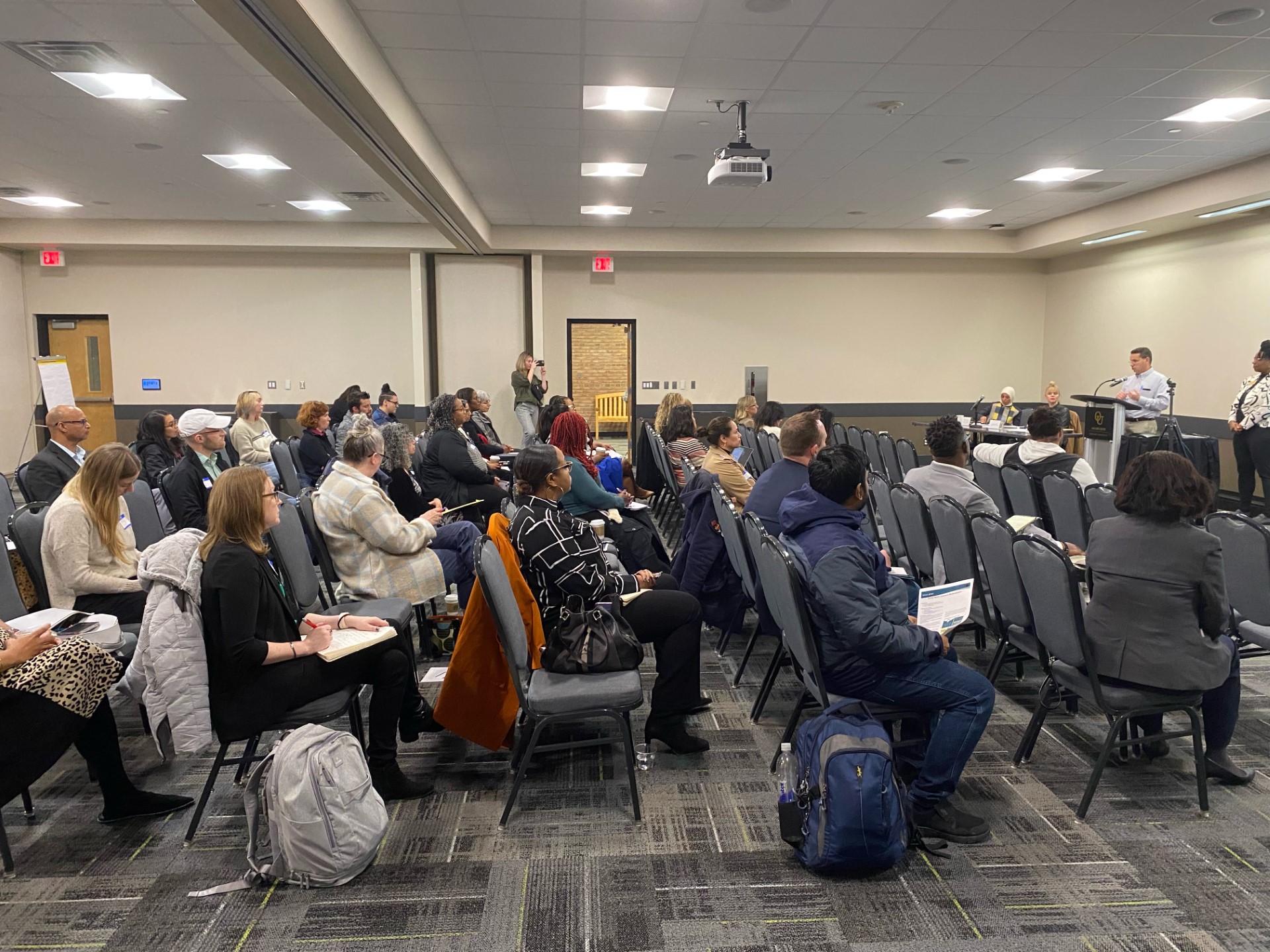Social Work Community Shares Critical Insight at the Statewide Mental Health Townhall
Thursday, October 26, 2023
(0 Comments)
Social Work Community Shares Critical Insight at the Statewide Mental Health Townhall
Oakland University was the host of a special mental health townhall with the Growing Michigan Together Council on Monday, October 23, 2023.
 The Growing Michigan Together Council (the Council) was established by Governor Gretchen Whitmer earlier this year to develop a long-term vision that addresses current and future challenges, and sets Michigan up for success in the 21st Century. The Council will advise the governor on specific policies to grow Michigan’s population, including identifying a population goal for 2050. The Growing Michigan Together Council (the Council) was established by Governor Gretchen Whitmer earlier this year to develop a long-term vision that addresses current and future challenges, and sets Michigan up for success in the 21st Century. The Council will advise the governor on specific policies to grow Michigan’s population, including identifying a population goal for 2050.
The Council’s four workgroups assembled in the last few months to collect data, conduct research, and collaborate to generate ideas that could grow Michigan's population. The townhall on the 23rd asked our behavioral health community to think of the mental health needs surrounding each recommendation (listed below).
The townhall was kicked off by Oakland University Social Work Program Director, Dr. Maria Beam, who welcomed the crowd of social workers, counselors, psychologists, educators, students, and more. Fatima Salman, LLMSW-Macro (President, National Association of Social Workers-Michigan Chapter and the Council Higher Education Workgroup member) then led a phenomenal panel of Michigan leaders in initial conversations about the Council’s recommendations. Panelists included:
Hilary Doe (Michigan Chief Growth Officer) Sean Egan (Michigan Deputy Director of Labor) Angela Street-Gardner, LMSW-Clinical & Macro (President, Michigan Association of School Social Workers) James Blundo, MA, LPC (Executive Director of Michigan Mental Health Counselors Association) Anwar Najor Durack, PhD (Assistant Dean for Student Affairs, Wayne State University School of Social Work) Christine Burk (Chief of Staff, Oakland Community Health Network) Lohren Carter-Nzoma (Assistant Superintendent at Detroit Public Schools)
Recommendations from attendees covered a range of areas, including: workforce retention issues (licensure barriers, paid internship, recruitment), supporting the mental wellness of both individuals and families, building vibrant communities that individuals want to stay and invest in, harnessing AI and technology to make Michigan a leader across the United States, building stronger collaborations across professions, and increasing the focus on workplace mental health and culture.
If you were not able to participate, we invite all of our social work community to add your thoughts and recommendations. Please share your insights with the Council at https://docs.google.com/forms/d/e/1FAIpQLSflTZrSUsQoqNNR5zUKTWTVdyRqGnBJMb_IZx86dbvO-QIAIw/viewform.
Workgroup Recommendations Pre K-12 Align governance and accountability to system vision and goals, while clarifying roles, eliminating inefficiencies and bolstering capacity. Commit to the Michigan Education Guarantee, that students graduate with the competencies they need to thrive now and throughout their lifetimes. Reimagine the job of teaching, enabling educators to innovate so students can learn for life. Fund the system fully, equitably, efficiently, and transparently so every student and every school has the resources needed to meet the system’s goals, including that of the Michigan Education Guarantee.
Higher Education Increase high school graduate enrollment rates (Michigan and out of state) in higher education to increase volume of skilled talent. Increase two-year success rates across populations to enable higher wage opportunities. Retain and attract postgraduate talent (out of state, international, and Michigan expats) to directly influence reversal of "brain-drain" (including university placemaking and innovation activities). Support higher education–employer partnerships that pull students through talent pathways and increase student awareness and adoption of learning journeys that lead to high-demand jobs/internships. Consider equity implications across proposed ideas, and work to close (versus widen) these gaps.
Jobs, Talent and People Implement a robust talent retention and attraction program including novel incentives, workforce development program expansion, community placemaking investments that support shared cultural experiences and targeted marketing. Implement the state’s economic development strategic plan with a focus on aligning Michigan’s workforce development programs, talent attraction and retention efforts, and growth-sector strategies to collectively drive regional priorities in a coordinated way. Prioritize programs, policies, and regional supports to develop a stronger pipeline of international talent that is retained long term through a welcoming environment for international immigrants and diverse communities in Michigan. Embrace Michigan's entrepreneurial and innovation roots and create a culture that supports entrepreneurship and innovation for all. Increase access to and affordability of culturally appropriate family support resources, including training and certifying a workforce to support the need.
Infrastructure and Places Provide the tools and incentives for local governments to create vibrant places and work together across jurisdictional boundaries to provide more efficient and cost-effective public services. Develop and revitalize housing stock to align with our housing needs and focus new development on infill to create vibrant, dense communities. Update Michigan’s transportation funding model to sufficiently fund and maintain the road network and support the development a more robust statewide transit system. Incentivize entities responsible for developing, operating, and maintaining infrastructure to coordinate their efforts through integrated asset management. Reorient investments and planning around water infrastructure to focus on protection of public health and climate readiness and ensure water rates are designed to sufficiently support community funding needs. Shift our economic development strategy from reactive to proactive by investing in site-readiness programming.
|